English : Unit 2 : Prose : The Night the Ghost Got In
Glossary
hullabaloo (v) – lot of loud noise made bypeople who are excited.
patrolman(n) – a patrolling police officer.
attic(n) – a space or room inside or partlyinside the roof of a building
slamming(v) – shutting a door or windowforcefully and loudly.
gruffly(adv.) – sadly
intuitively(adv.) – without consciousreasoning, instinctively
whammed(v) – struck somethingforcefully
bevelled(v) – reduced to a slopping edge
rending(v) – tearing to pieces
yanked(v) – pulled with a jerk
zither(n) – a musical instrumentconsisting of a flat wooden sound box with numerous strings stretched across it, placed horizontally and played with fingers
guinea pig(n) – a domesticated taillessSouth American rodent originally raised for food
hysterical(adj.) – affected by wildlyuncontrolled emotion
creaking(v) – making a squeaking soundwhen being moved
indignant(adj.) – feeling or showinganger or annoyance at what is perceived as unfair treatment
holster(n) – a holder made of leather forcarrying handgun
rafter(n) – a beam forming part of theinternal framework of a roof
deserter(n) – a person who leaves thearmed force without permission.
While reading questions:
a. Where was the author when he heard the noise?
The author was in the bathroom when he heard the noise.
b. What did the narrator think the unusual sound was?
At first, the narrator thought the unusual sound was a burglar. Later he felt it was a ghost.
c. What were the various sounds the brothers heard when they went downstairs?
When they went downstairs the brothers heard the footsteps circling the dining-room table like a man running and it started up the stairs towards them.
d. Who were the narrator’s neighbours ?
Mr. Bodwell and his wife were the narrator’s neighbours.
e. How did the Bodwells react, when a shoe was thrown into their house?
When a shoe was thrown into their house, Mr. Bodwell was shouting angrily. Mrs. Bodwell said that they would sell the house and move to Peoria.
f. What did the Bodwells think when they heard the mother shout?
The Bodwell’s thought that there was a burglar in their house.
g. What was the grandfather wearing?
The grandfather was wearing a long flannel nightgown over long woolen pants, a nightcap, and a leather jacket around his chest.
h. What conclusions did grandfather jump to when he saw the cops?
Grandfather thought that the cops were the deserters from General Meade’s army.
i. Were the policemen willing to leave the house?
No, the policemen were not willing to leave the house.
j. What made the reporter gaze at the author?The author’s reply ‘We had ghosts’ made the reporter to gaze at him.
A. Answer the following questions in a sentence or two.
1. Why was the narrator sorry to have paid attention to the footsteps?
The narrator was sorry because his imagination of considering his Grandfather as a ghost
2. Why did Herman and the author slam the doors?
Herman and the author slammed the door because of their fear of the ghost.
3. What woke up the mother?
Slamming of the doors by the narrator and his brother woke up their mother.
4. What do you understand by the mother’s act of throwing the shoe?
Author’s mother did not want to take risk by getting down. At the same time, she wanted the police to come there. So, she threw the shoe at neighbour’s home to seek help.
5. Why do you think Mrs. Bodwell wanted to sell the house?
Mrs. Bodell wanted to sell the house because she was disturbed often.
6. How did the cops manage to enter the locked house?
The cops broke the front door. Thus they manged to enter the locked house.
7. Why were the policeman prevented from entering grandfather’s room?
Grandfather mistook the police as General Meade’s men who were retreating. With that thinking, he harmed them. So, the police were prevented.to enter grandfather’s room.
8. Who used the zither and how?
The narrator’s pet Guinea pig used the zither. It used to sleep on it.
9. Mention the things that the grandfather imagined.
Grandfather imagined that the cops were General Meade’s men. He thought that they were beginning to retreat and even desert
B. Answer the following questions in about 100-150 words.
1. Describe the funny incident that caused the confusion in the house.
Prose : THE NIGHT THE GHOST GOT IN
Author : James Grover Thurber
Theme : Chaos in the house
Characters : The narrator’s family, Mrs. Bodwell, Joe, Reporter, Herman
Outline : Narrator – strange sound – thought – burglar or ghost – Mother – seek help -Bodwell – called police- Grandfather misunderstood – General Meade’s men – shot – grand father – walked – for water
It was about a quarter past one o’ clock in the morning. The narrator was in the bathroom. He heard a strange sound. He was scared. He thought it was a burglar or a ghost. So, he went to his brother, Herman’s room. They came out and looked downstairs. Nothing was there. They heard the footsteps circling the dining-room table like a man running and it started up the stairs towards them. So they rushed to their rooms and slammed the doors. The narrator’s mother was aroused by the sound. They thought that there was a burglar in the house. So she threw her shoe at their neighbour, Mr.Bodwell’s window to seek help. Mr. Bodwell called the police. When the police broke into the door, the narrator’s grandfather mistook them as General Meade’s men who were retreating. So he grabbed the gun from them and shot at the police. The police left the house empty handed finally. Next morning, grandfather told that he came to the dining room for water, the previous night. These are the incidents that caused the confusion in the house.
ESSAY
• Introduction
• A strange sound
• Call for the police
• Entry of the police
• Mystery behind the chaos
• Conclusion
Introduction
James Grover Tburber was an American cartoonist, best known for his cartoons and short stories. This lesson clearly tells that too much of imagination will, mislead the situation. Though the theme is trivial, the story provokes all elements of a horror drama.
A strange sound
It was about a quarter past one o’ clock in the morning. The narrator was in the bathroom. He heard a strange sound. He was scared. He thought it was a burglar or a ghost. So, he went to his brother Herman’s room. They came out and looked downstairs. Nothing was there. They heard the footsteps circling the dining-room table like a man running and it started up the stairs towards them. So they rushed to their rooms and slammed the doors.
Call for the police
Their mother was aroused by the sound. They thought that there was a burglar in the house. So she threw her shoe at their neighbour Mr.Bodwell’s window to seek help. Mr. Bodwell called the police.
Entry of the police
When the police broke open the door, the narrator’s grandfather mistook them as General Meade’s men who were retreating. So he grabbed the gun from them and shot at the police. The police left the house empty handed finally.
Mystery behind the chaos
The next morning grandfather told that he had walked in the kitchen to have some water the previous night.
Conclusion
It finally becomes clear that the narrator mistook his grandfather walking in the dark for a burglar and then a ghost. Their imagination rewarded them a sleepless night of chaotic activities.
Moral: What you see can be a lie; what you hear can be a lie;
what you investigate is real/true
2. Narrate the extensive search operation made by the policemen in the house.
Prose : THE NIGHT THE GHOST GOT IN
Author : James Grover Thurber
Theme : Supernatural
Characters : Mr. Bodwell, Mrs. Bodwell, Joe, Reporter, Herman
Prose outline : police broke – opened – main door- search – operation – ruined – spilled – objects – drawers- furniture- ransacked – tom – suitcase- zither – Guinea pig – sleep-Chaos -grandfather misunderstood – deserters of general Meade’s army- grab -shot – Pitty – old man- great disappointment- cops – empty handed
The narrator and his family heard a strange sound at his home. They thought that there was a burglar in the house. They called for the police with the help of their neighbour. The police broke open the main door. During the search, the police ruined the whole house. They spilled all the things from the drawers, the windows were shut up and pulled down, furniture fell with dull thumps. The floor was ransacked and clothes were tom. While pulling a suitcase, they found a zither. Five or six policemen sprang for the attic door, where the narrator’s grandfather was sleeping. Chaos came when Grandfather mistook the police as General Meade’s men who were retreating. He managed to grab a gun from the police and shot at them. It led to crack the rafters. Smoke filled the attic. They all finally got downstairs and locked the door against the grandfather. It was a pity that the police could not get the gun from the old man. With great disappointment, the cops left the home empty handed.
ESSAY
• Introduction
• Search of the police
• Chaos in the attic
• Disappointed policemen
• Conclusion
Introduction
The narrator and his family heard a strange sound at his home. They thought that there was a burglar in the house. They called for the police with the help of their neighbour.
Search of the police
The police broke open the main door. During the search, the police ruined the whole house. They spilled all the objects from the drawers, the windows were shot up and pulled down, furniture fell with dull thumps. The floor was ransacked and clothes were tom. While pulling a suitcase, they found a zither
Chaos in the attic
Five or six policemen sprang for the attic door where the narrator’s grandfather was sleeping. Chaos came when Grandfather mistook the police as General Meade’s men who were retreating. He managed to grab a gun from the police and shot at them. It led to crack the rafters. Smoke filled the attic.
Disappointed policemen
They all finally got downstairs and locked the door against the grandfather. It was a pity that the police could not get the gun from the old man. With great disappointment, the cops left the home empty handed.
ConclusionThese were the series of incidents that happened during the search operation.
Moral: Misunderstanding always leads to chaos
Vocabulary
Slang Expression:
Slang is a type of language consisting of words and phrases that are regarded as very informal and more common in speech than writing. They are typically restricted to a particular context or group of people.
C. Look at the following expressions from the text. With the help of your teacher rewrite them in standard English. One has been done for you.
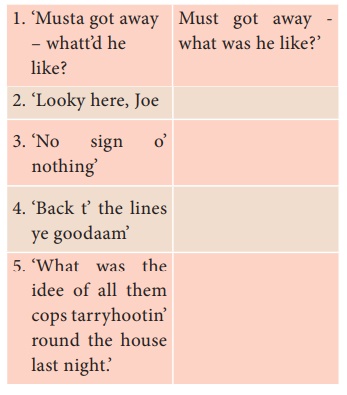
1. ‘Musta got away – whatfd he like? – Must got away – what was he like?’
2. ‘Looky here, Joe – Look here, joe
3. ‘No sign o’ nothing’ – No sign of anything
4. ‘Back t’ the lines ye goodaam’ – Back to the lines you god-damn
5.‘What was the idee of all them cops tarryhootin’ round the house last night.’ – What was the idea of all the cops tarryhootin around the house last night (tarryhootin – loitering and making a lot of noise)
Singular and Plural Forms.
In this lesson, we find plural forms such as furniture, houses, windows, burglars, boxes, shelves, policemen. You may notice that the words have taken up different suffixes to form plurals. This is because English words have different origins.
D. Complete the given tabular column with the suitable plural forms.
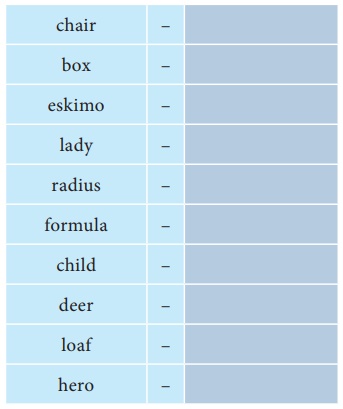
chair – chairs
box – boxes
eskimo – eskimos
lady – ladies
radius – radii
formula – formulae
child – children
deer – deer
loaf – loaves
hero – heroes
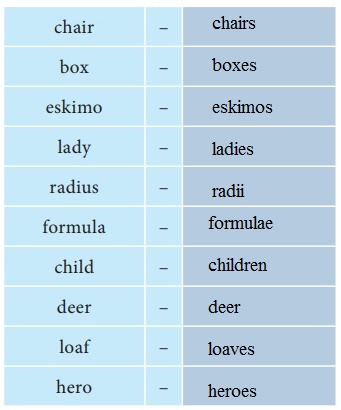
Listening
E. Listen to the story and answer the following.
1. The rich man was from….
a. Nagaland
b. Thailand
c. Finland
Ans: Thailand
2. Where did Chulong catch the bird?
Chulong caught the bird in a bush in his garden.
3. Why did Chulong catch the bird?
Chulong caught the bird in order to become richer by selling it for a big amount.
4. What will happen to the bird in imprisonment?
If the bird is kept in imprisonment, it will lose its beauty and its sweet voice.
5. What did the bird suggest Chulong, in exchange for its freedom?
The bird suggested Chulong to teach him 3 important rules of life, in exchange for its freedom
6. Does Chulong want to earn money honestly?
No, he was a greedy man, he wanted to earn more money through dishonest way.
7. What were Chulongs plans for the the bird?
Chulong’s first plan was to sell the beautiful bird for a huge amount. His second plan was to kill it and to eat its meat.
8. Who is wise according to you?
According to me, the bird is wiser than Chulong.
9. Is the bird a crow?
No, the bird is not a crow.
10. What are the three rules given by the bird?
(i) Never believe everything others say.
(ii) Never be sad about something you do not have.
(iii) Never throw away what you have in your hand.
Speaking
F. Quiz: Who am I ?
Let us play this game in class
· Who Am I? is a guessing game where players use ‘yes’ or ‘no’ questions to guess the identity of a famous person.
Questions are based upon the traits and characteristics of a person everyone will be able to identify.
· Divide the class into groups. One group should decide the personality while the other group should ask ‘yes’ or ‘no’ type questions. To win the game, a team needs to find out the person within 10 clues.
Let us play this game in class:
Who Am I? is a guessing game where players use ‘yes’ or ‘no’ questions to guess the identity of a famous person. Questions are based upon the traits and characteristics of a person everyone will be able to identify.
Divide the class into groups. One group should decide the personality while the other group should ask ‘yes’ or ‘no’ type questions. To win the game, a team needs to find out the person within 10 clues.
Sample questions to ask. Answers must be ‘yes’ or ‘no’ only.
· Are you a male (female)?
· Are you a famous personality?
· Are you a singer (dancer, actor)?
· Are you a historical figure?
· Are you young (old)?
· Are you alive now?
· Does your name start with ‘___’ ?
· Is he/she ____ ?
G. Use this passage to play the game. You can collect information on other famous personalities and play too.
Charlie Chaplin was born on April 16, 1889, in London England. His birth name was Charles Spencer Chaplin, though he had many nicknames growing up such as Charlie, Charlot, and The Little Tramp. His father, Charles Chaplin, and his mother, Hannah Chaplin, were inducted into the music hall of fame, leading the way to his exposure even as a young boy. His first onstage moment was when he was 5 years old; he sang a song that was intended to be sung by his own mother; she had become ill at the time of the performance, so little Charlie Chaplin stood instead and performed for his mother.
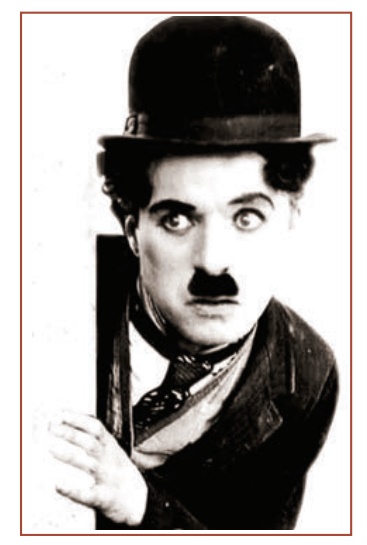
Charlie Chaplin came to the United States in 1910, at the age of 21. He was brought to New York, which was known to be a great place to start out for anyone trying to become a professional actor. Two years later, in 1913, Chaplin signed his very first contract at Keystone and it was no time before he headed to Hollywood. His first movie premiered in 1914, “Making a Living,” and went on to make over 35 movies total in that year alone. Charlie Chaplin grew to become one of the most popular and successful actors of all time. The moment that really kicked off his long career was in 1921 when he starred in, and produced, his first full length film called “The Kid.” From then on, most people all over the world knew Charlie Chaplin and loved his movies. He had a great career and life, dying on December 25, 1977, in Vevey, Switzerland. He had apparently died of natural causes in his sleep from old age.
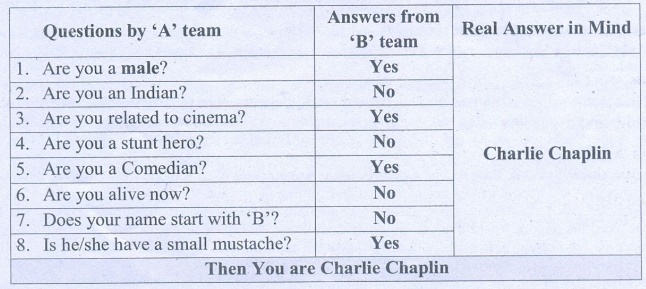
Reading
Read the following incident carefully to answer the questions that follow
The tie that does not bind
“Oh, so you’re going abroad? Can you bring me back…..?” I’ve been asked to bring back a vaccine for a course. Once I searched the suburbs of Paris for two days for a special brand of ceramic paint. Having spent a lot of money for Cartier lighter refills, I had them confiscated at the airport just before boarding because the gas might be dangerous in the air.
Now, two months before a trip, I stop talking to people so they won’t suspect I’m about to travel. But someone always catches me.” I’ve heard you’re going to New York, and I want you to get something for me. It’s just a little thing you can find anywhere. I don’t know exactly how much it costs, but it shouldn’t be much. We’ll settle up when you get back”.
What Gilson asked me to buy was, in fact a little thing: a tie. But not just any tie. He wanted a tie with a small embroidered G. Any colour would do, as long as it had his initial. Look , this is a special flight, I explained . We are only staying Saturday through Tuesday. On the day we arrived I didn’t have time to think about the tie, but strolling around on Sunday I did see ties bearing various letters in more than one shop window. They were cheap, just a dollar, but all the shops were closed.
On Monday, lunch lasted the whole afternoon. Then it was Tuesday morning, time to leave. It was only when I saw our airport bus waiting outside the hotel that I remembered the tie.
I told the group to go on. I would get a taxi to the airport. And so I went in search of a nearby shop where I had seen ties.
But I couldn’t find it. I walked further down the street -one, two, three blocks – all in vain. Back at the hotel, a bit anxious now, I took my suitcase, got a taxi and asked the driver to rush to the street where I had seen them.
The driver stopped at each shop we passed so I could look from the window. The stores had all sorts of ties, but not the kind I was looking for.
When I finally thought I had located the right shop, I decided to go in and check. The driver refused to wait. Parking was prohibited, he said. I promised to double the fare, jumped out and ran into the shop. Was I going to miss the plane just for a damned tie?
The salesman was unbearably slow. When I realized that the smallest change I had was a ten dollar note , I grabbed ten ties of different colours so I wouldn’t have to wait for change. I rushed out with the ties in a paper bag.
On the street I looked around. The taxi had vanished, taking my suitcase. What is more, I was going to miss the plane.
I ran to the corner, and hope flared up again: the taxi was waiting in the next street. Quick to the airport! As I settled down inside the taxi. I sighed with relief. Gilson was going to have enough initialized ties to last him a lifetime.
When I reached the airport, I paid the taxi driver the double fare and grabbed my suitcase. Panting, I boarded the plane under the reproachful gaze of the other passengers, all primly seated with their seat belts fastened. Ready to take off. Departure had been delayed because of me.
“At least I hope you found your tie”, said one who knew the story.
“I did”, I answered triumphantly.
After making myself comfortable, I reached for the paper bag to show the ties.
I had left it behind; in the taxi.
Fernando Sabino.
H. Read the incident again and answer the following questions.
1. What was the writer always asked to do whenever he planned to go abroad?
The writer was always asked to buy some gifts from abroad whenever he planned.
2. What did Gilson want the writer to bring for him?
Gilson wanted to bring a tie with a letter ‘G’ embroidered on it.
3. When did the writer remember the fact that he had to buy something for Mr. Gilson?
When the writer saw the airport bus on Tuesday morning, he remembered to buy a tie for Mr. Gilson.
4. Why were the other passengers in the flight gazing at the writer?
The flight was delayed due to the writer’s late arrival. And so the other passengers in the flight were gazing at the writer.
5. What is the humour element in the above incident?
The humour element was that the writer had left the tie in the taxi. All his efforts became vain.
I. Suggesting titles:
Title summarises the story. Each paragraph is a part of the story. Look at the following expressions and find out the paragraphs that best suit these expressions.
1. Oh, No! But it happens!
2. Don’t let out your travelling dates
3. Anyway, people will be people
4. Search begins
5. Things are not that easy
6. Hurry invites worry
1. Oh, No! But it happens!
“Oh, so you’re going abroad? Can you bring me back…?” I’ve been asked to bring back a vaccine for a course. Once I searched the suburbs of Paris for two days for a special brand of ceramic paint. Having spent a lot of money for Cartier lighter refills, I had them confiscated at the airport just before boarding because the gas might be dangerous in the air.
2. Don’t let out your travelling dates
Now, two months before a trip, I stop talking to people so they won’t suspect I’m about to travel. But someone always catches me.” I’ve heard you’re going to New York, and I want you to get something for me. It’s just a little thing you can find anywhere. I don’t know exactly how much it costs, but it shouldn’t be much. We’ll settle up when you get back”;
3. Anyway, people will be people
What Gilson asked me to buy was, in fact a little thing: a tie. But not just any tie. He wanted a tie with a small embroidered G. Any colour would do, as long as it had his initial. Look, this is a special flight, I explained. We are only staying Saturday through Tuesday. On the day we arrived I didn’t have time to think about the tie, but strolling around on Sunday I did see one shop window. They were cheap, just a dollar, but all the shops were closed.
4. Search begins
I told the group to go on. I would get a taxi to the airport. And so I went in search of a nearby shop where I had seen ties. But I couldn’t find it. I walked further down the street-one, two, three blocks – all in vain. Back at the hotel, a bit anxious now, I took my suitcase, got a taxi and asked the driver to rush to the street where I had seen them. The driver stopped at each shop we passed so I could look from the window. The stores had all sorts of ties, bill not the kind 1 was looking for.
5. Things are not that easy
When 1 finally thought I had located the right shop, i decided to go in and check. The driver refused to wait. Parking was prohibited, he said. I promised to double the fare, jumped out and ran into the shop. Was I going to miss the plane just for a damned tie?
6. Hurry unites worry
When I reached the airport, I paid the taxi driver the double fare and grabbed my suitcase. Panting, I boarded the plane under the reproachful gaze of the other passengers, all primly seated with their seat belts fastened. Ready to take off. Departure had been delayed because of me. “At least 1 hope you found your tie”, said one who knew the story. “I did”, I answered triumphantly. After making myself comfortable, I reached for the paper bag to show the ties. I had left it behind; in the taxi.
J. Look at the following situations the writer was in. He could have avoided the situation and saved himself. Glance through the write up again and comment on what the writer should have done in the following situations.
· Gilson asked the writer to bring a tie.
Answer: The writer could have avoided Gilson by explaining that the stay was a short period. And so he cannot go for shopping.
· On the day of arrival, the writer had no time to think about the tie.
Answer: He should have bought the tie when he have a lot of time on the day of arrival.
· The writer remembered about the tie when the bus was leaving for the airport.
Answer: He should have gone directly to the airport. It is wrong time for shopping.
· The writer walked down in search of the shop.
Answer: The writer should have taken the address of the shop from a local person instead of wasting his time.
· The writer rushed out with the tie in a paper bag.
Answer: The writer should have kept the tie in his coat pocket.
K. State whether the following statements are true or false.
1. The narrator searched for three days to buy ceramic paint. – False
Correct Statement: The narrator searched for two days to buy eeramie paint
2. The author was going to New York. – True
3. Gilson asked the narrator to buy a tie. – True
4. The taxi driver took away the narrator’s suitcase. – False
Correct Statement: It was not a parking area. So he was waiting in a corner.
5. Departure was delayed because of the author. -True
6. The author left the ties in the taxi.– True
Writing
How to Write a Good Speech
1. Have an inspiring OPENING and ENDING.
2. Appropriate(suitable)TONE of VOICE. (e.g.) sincere for a serious issue, humour for comedy etc
3. Adapt speech for PURPOSE and AUDIENCE. (e.g.) teenagers, mixed audience, teachers, children etc
4. Organise IDEAS logically and do not confuse the audience.
5. Use EMOTIVE language to CONVINCE your audience that what you are saying should be listened to.
(e.g.) Even if they put us in chains, torture us and leave us to bleed we will not move. Blood will be our victory!
6. Use RHETORICAL QUESTIONS – asking a question for persuasive effect with out expecting are play (because the answer is obvious) Eg: Was he not a good man? (knowing that the audience agree anyway)
7. Make sure you are writing in the CORRECT PERSON
(e.g.) I believe that … I knew him well …
8. Use interesting facts and figures (e.g.) 200000 people… with diagrams or charts to help your audience visualize it.
M. Write a speech for your school Literary Association celebration with the given lead.

1) Opening :- Good morning dear members,
2) Purpose :- I am very glad to welcome you to the first annual meeting of our English literary association.
3) Audience :- You would be pleased to know that several award winning authors would visit our place to deliver lectures on the importance of English language learning, its usage, and application to the modern world on this auspicious occasion.
4) Language – Some Good Describing Words (Adverbs and Adjectives), Emotive Words, Imagery etc. :- I stand before you all to address the aim of this association that is why we should leam English in this technological advanced world. English is the window to the world. It is spoken in nook and comer of this world. It is spoken by more than 750 million people in the world. So it plays an important role in our life. With the learning of English, we can communicate with people around the world. So we must leam it with full spirit.
5) Ending :- Thank you for giving me this opportunity. Let’s us all unite together to achieve our association’s aim.
Grammar
Articles
A, An and The are called Articles.
We use a or an with singular nouns only.
(e.g.) A girl, An orange
We use a with singular nouns and adjectives which begin with a consonant sound.
(e.g.) A computer, A unit (yu+nit), A wonderful artist
We use an with singular nouns and adjectives which begin with a vowel sound.
(e.g.) An artist, An M.L.A. (em.el.a), An honest shopkeeper
NOTE
Words beginning with consonant letters do not always begin with consonant sounds.
Similarly words beginning with vowel letters do not always begin with vowel sounds.
(e.g.) Honour (sounds like – onour) European (sounds like yu-ropean)
We use the when a person, an animal, a plant, a place, a thing is mentioned for a second time.
(e.g.) I bought a book this morning. I am reading the book now.
We use the when it is clear to the listener or reader which person, animal, place, or thing we are referring to.
(e.g.) The judge found him not guilty.
We use the when there is only one such thing.
(e.g.) The earth goes round the sun.
We usually use the before ordinal numbers.
(e.g.) I live on the third floor.
We use the before some proper nouns such as :
(e.g.) The Indian Ocean, The Arabian Sea
We use the before names of most buildings, landmarks, monuments and natural wonders. (e.g.) The Park Hotel, The Taj Mahal
We use the before names of places containing of
(e.g.) The Republic of China.
The names of places ending in plurals.
(e.g.) The Andaman and Nicobar Islands, The Netherlands.
Some proper nouns are not preceded by an article.
· the names of continents – Africa, Asia
· the names of countries – Belgium, India
· the names of towns and cities. – Tokyo, Chennai
· the names of streets – Ritchie Street.
Some nouns can be counted and they are called as countable nouns; some cannot be counted and they are called uncountable nouns.
We use a or an only before countable nouns.
(e.g.) A leaf fell off the tree. (countable)
Rain can cause flooding (uncountable)
We use the with uncountable nouns, when it is clear to the reader which things we are referring to. We do not use the with uncountable nouns when we are talking in general. (Uncountable nouns do not take the plural forms).
(e.g.) The rice in this super market is good. Rice is the staple food of Asians.
The word some can be used with both countable and uncountable nouns in the following ways.
(e.g.) I want some apples.
I want some papers.
Nagarajan and Dhanalakshmi want to buy a new house. They have come to see a house for sale. Complete the conversation below by adding a, an or the.
Nagarajan : Well, here we are, No.8, Kaveri Street. I think this is the house we saw online. What do you think of the location?
Dhanalakshmi : It is in a nice neighbourhood. And it’s close to the railway station.
Nagarajan : And the bus stop is not too far away.
Dhanalakshmi : How many rooms are there?
Nagarajan : There are three rooms, a kitchen and a balcony.
Dhanalakshmi : There is a lawn behin the house, right?
Nagarajan :That’s right the lawn is actually quite large. Did you see any photos of the living room, online? What does it look like?
Dhanalakshmi : The living room looks great. It looks bright and airy. It has a nice view of the hills. But the kitchen looks a little small.
Nagarajan : And, I remember you said there isn’t a store room, right?
Dhanalakshmi : No, but there is an attic, where we can store things.
Nagarajan : I hope this house is a better option.
Dhanalakshmi : Lets wait for the real estate agent. She said, she would be here at three o’clock.
Nagarajan : Look there she is!
Few articles are missing in the given passage. Edit the passage given below by adding suitable articles where ever necessary.
My neighbourhood is very interesting place. My house is located in apartment building downtown near many stores and offices. There is small supermarket across street, where my family likes to go shopping. There is also post office and bank near our home. In our neighbourhood there is small, Green Park where my friends and I like to play on weekends and holidays. There is small pond near park and there are many ducks in park. We always have great time. In addition there is elementary school close to our home where my little brother studies in third grade. There are so many things to see and do in my neighbourhood that’s why I like it. It’s really great place.
Answer: My neighbourhood is a very interesting place. My house is located in an apartment building downtown near many stores and offices. There is a small supermarket across the street, where my family likes to go shopping. There is also a post office and a bank near our home. In our neighbourhood there is a small, Green Park where my friends and I like to play on weekends and holidays. There is a small pond near the park and there are many ducks in the park. We always have a great time. In addition there is an elementary school close to our home where my little brother studies in the third grade. There are so many things to see and do in my | neighbourhood that’s why I like it. It’s really a great place.
Prepositional Phrases
These prepositions are formed by two-word or a three- word combination such as according to, along with, at the time of, because of, owing to, instead of etc. These kinds of prepositions are used frequently in our day to day life.
Examples
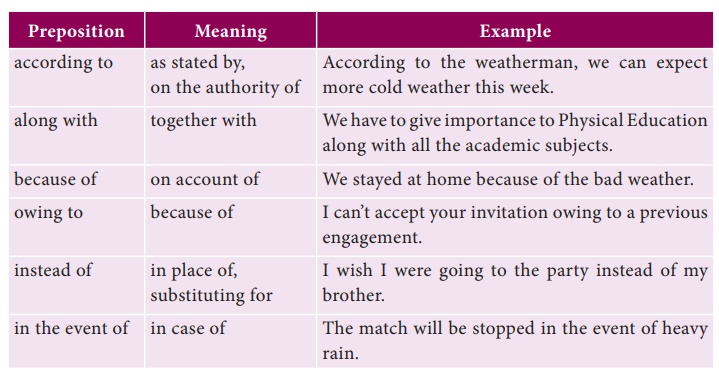
C. Refer to the dictionary to find out the meaning of the following prepositions and match them with the correct meaning.
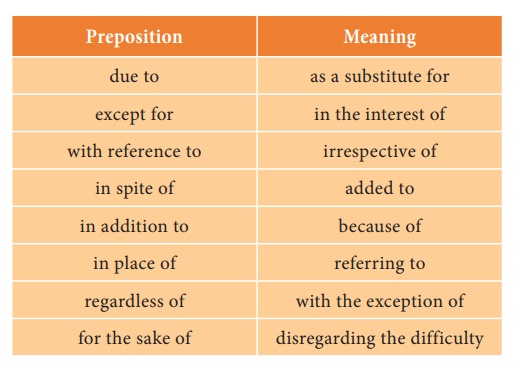
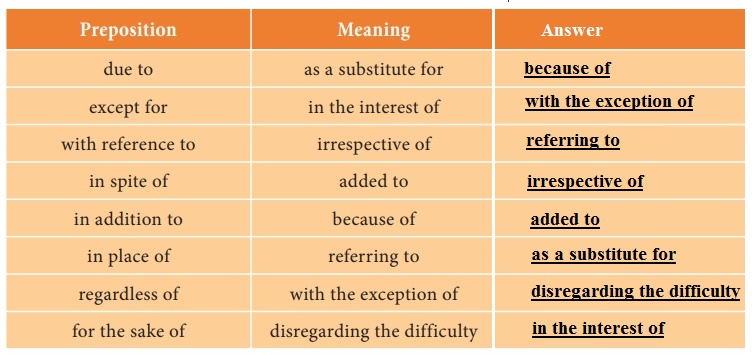
D. Fill in the blanks by choosing the most appropriate prepositional phrase from the given options.
1. Everything falls to the ground because of earth’s gravitational pull.
a. in addition to
b. because of
c. cause of
2. The trial was conducted in accordance with the procedure of law.
a. in accordance with
b. due to
c. despite of
3. There is a temple right in front of my house.
a. in back of
b. apart from
c. in front of
4. As a result of of his hard work, he achieved the target.
a. instead of
b. result of
c. apart from
5. Failure is often the effect of negligence.
a. effect of
b. consequence of
c. reason of
6. Children are given toys in addition to sweets on Children’s day.
a. on top of
b. in addition to
c. due to
7. The parents must be informed in case of any indiscipline conduct of their wards.
a. because of
b. in case of
c. in spite of
8. He didn’t turn up due to his busy schedule.
a. consequence of
b. due to
c. except for
9. Global warming is an effect of the green house emission.
a. an effect of
b. in spite of
c. in addition to
10. in spite of several warnings, he continued to swim.
a. due to
b. in spite of
c. because of
E. Edit the following passage by replacing the underlined incorrect words with correct prepositional phrases.
Janu is studying in class X. In the event of the teachers according to
she is a disciplined student. In addition to her poverty, she inspite of
is always neat. Many students like her in case of because of
her simplicity. According to her studies, she also besides /in addition to
participates in sports. She gets on with everyone in case of regardless of/irrespective of
age and gender in the school. In opposition to taking leave, she ensures in case of
that she completes the work given before she goes to school next day.














